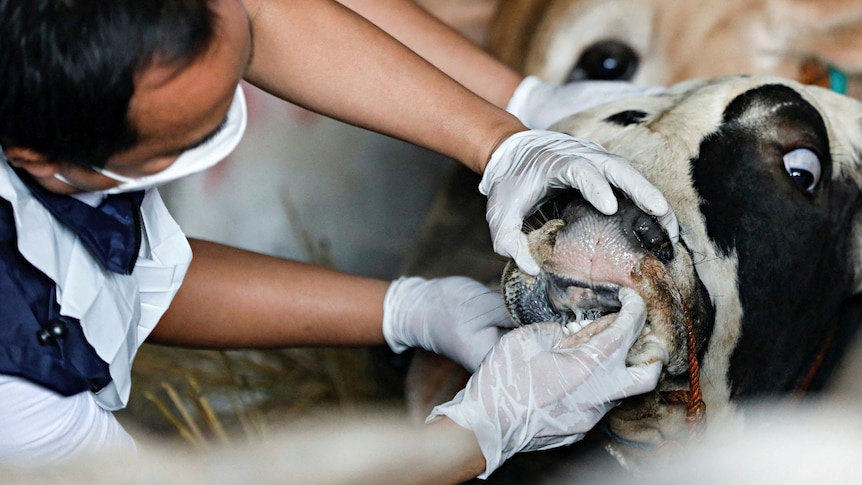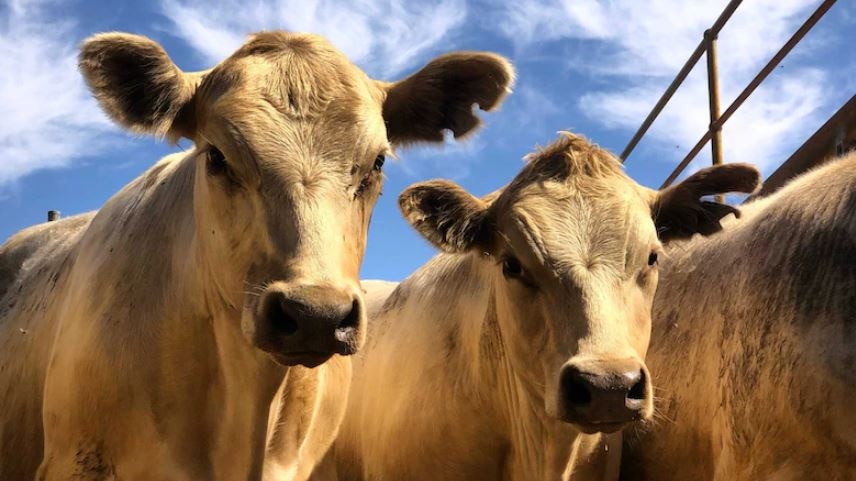Nathaniel Rose kept his shoes and sandals separate from his main baggage as he traveled home from Bali to Melbourne last week.
During his 10-day holiday on the Indonesian island, Mr Rose said he was aware of concerns that tourists visiting Bali might bring foot-and-mouth disease (FMD) back to Australia, including via contaminated soil on footwear.
“I did one trip to Mount Batur that could be considered rural. We walked through the village along the dirt track,” he said.
As per Australian government advice, Mr Rose thoroughly cleaned his footwear before he got on the plane.
“There were foot-and-mouth disease signs at Denpasar Airport,” he said.
“When we got off [the plane] there were biosecurity officers and we had to walk on a disinfectant mat.”
An outbreak of FMD could devastate Australia’s livestock industries, cost the Australian economy around $80 billion, and lead to many animals being slaughtered to control the disease.
Those potential consequences are why the agriculture industry here has been begun on tenterhooks since an outbreak in Indonesia in May, with some calling for a travel ban.
Farmers and authorities in Indonesia are working hard to contain the virus’s spread, while the Australian government this week committed $10 million towards biosecurity measures in Indonesia to tackle the outbreak.
FMD is a highly contagious animal disease that affects all cloven-hoofed animals and is carried in many ways, including by live animals, in meat and dairy products, soil and untreated hides.
It is commonly spread between animals through inhalation, ingestion and contact with infected animals, but is not to humans, including by eating affected meat.
The virus is different to hand, foot and mouth disease common in children.
Local farmers implement strict controls
The outbreak in Indonesia is the biggest since 1990 and is estimated to be costing the local economy $200 million per month.
Since May, 479,000 animals have been infected with FMD in Indonesia.
More than 9,000 animals have been killed to try to control the virus’s spread, while another 5,189 have died from the disease.
The province of East Java currently has the highest number of infections, with a mix of farms in that area, including smaller traditional farms and others run by large companies.
East Java’s biggest dairy farm is owned by Greenfields Indonesia, a company established by a group of Australian and Indonesian entrepreneurs.
The farm, with 16,000 cattle, has implemented strict biosecurity measures, despite no cases of the virus being detected there.
Richard Slaney, from Greenfields Indonesia, said the company’s cattle underwent frequent health checks and were being vaccinated against the disease.
Mr Slaney said there were also strict controls to clean workers’ dirty clothing and footwear, vehicle tires and animal feed.
“No outside visitors are allowed to come [to the property],” I added.
He said vehicles were sprayed from “top to bottom”.
“All vehicles have gone through an additional cleaning process and very strict controls are also applied to the milk tank transport vehicles,” he said.
Small farmers can’t afford vaccines
Robi Gustiar is a cattle farmer and the secretary-general of the Indonesian Cattle and Buffalo Breeders Association that represents small farmers who have between five and 30 cattle.
He said smaller farmers were also doing what they could to control the outbreak.
“For farmers who have up to five cattle, they spray disinfectant in locations around cattle pens and on vehicles.”
He said some farmers were still waiting for vaccines from the government, while medium and larger traditional farmers were proposing to purchase vaccines independently to access them faster.
Mr Gustiar said small farmers could not afford vaccines and distribution was not easy.
“Indonesia is an archipelago country, so transportation is a problem. They [need to] make sure the vaccine is still active when it reaches the cattle,” he explained.
Australian government support for Indonesia announced this week included supplying more vaccines to Indonesia as well as protective equipment, training and expertise.
Agriculture Minister Murray Watt said $4 million of the $10 million dollars allocated was for vaccine purchasing.
“This is on top of support already announced for Indonesia, which included 1 million doses of foot-and-mouth disease vaccine and almost half a million doses of lumpy skin disease vaccine already committed by the Australian government,” he said.
Disaster authority bolsters Indonesia’s response
According to Indonesia’s Foot and Mouth Taskforce, more than 1.2 million doses of vaccine have been administered to animals.
Spokesperson Wiku Adisasmito said he hoped that the outbreak would be under control by the end of the year.
Mr Adisasmito added that there had been no new reported infections in six provinces, including Bali, but cases were still spreading in other areas.
The taskforce is overseeing the implementation of a raft of biosecurity measures, including treatment and recovery of livestock, livestock testing, conditional slaughter and vaccination.
“Foot mats and disinfectant spray [have been placed] at the arrival and departure of Ngurah Rai [Denpasar] and Sentani International [Jayapura] airports, and other areas that are included in the foot-and-mouth-free zone,” Mr Adisasmito said.
Professor Rochad Tawaf from the Committee for Agricultural Empowerment — a not-for-profit organization in West Java — said Indonesia’s response to the outbreak had improved since the National Disaster Management Authority was assigned to tackle the outbreak.
“For me, this means that the government is already handling the situation correctly and making it better, and the farmers also made their contribution by managing their cattle better than before,” he said.
Farmers remain concerned about disease spread
Welly Salim is originally from Indonesia and has been in the cattle business for 25 years.
For the past 10 years, he has lived in central Queensland, near Rockhampton, and owns about 1,400 cattle.
Despite all the precautions, he, like other farmers, remains concerned about the possibility of FMD reaching Australia.
Mr Salim said that, while the Indonesian government may not have done enough to reassure Australian farmers, some comments from Australian politicians have inflamed the situation.
“I think some comments from politicians are over-statements on the possibility of tourists bringing back the virus, but the threat is real,” he said.
“We need to find the most-friendly solution for Indonesia, to help Indonesia to solve the problem.”
Mr Salim pointed out there would also be a huge impact on Indonesia as well if the disease spread to Australia.
“Indonesia is the biggest market for live cattle export from Australia,” he said.
“Indonesia needs around 600,000 tonnes of boxed beef every year.”
.

